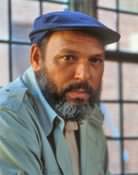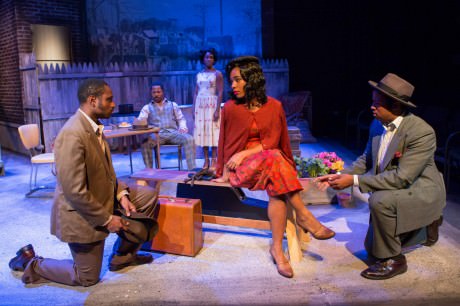Under the affecting direction of Michele Shay, No Rules Theatre Company’s production of August Wilson‘s Seven Guitars raises an intimate, open-eyed awareness of lives without long-term satisfaction, with too many unfulfilled hopes and dreams, and too loose a hold on the redemption of long-term unconditional love. There is plenty of sharp humor to protect and medicate from the pain.

No Rules’ production of Seven Guitars by August Wilson “will leave fingerprints” on you; to use a quote from one of the play’s characters. You will want to allow those fingerprints to leave their marks. They are marks of African-American men arrested “in advance of an expected crime” to use other dialogue from the play. They are marks as well from women who protect themselves even as they want and wait to open and flower.
Seven Guitars (1995) is a rare sighting in the DC area; one last seen at the summer 2008 Kennedy Center’s August Wilson Festival of staged readings. It is one of the ten plays in Pulitzer Prize-winning Playwright Wilson’s “Pittsburgh Saga” about African-American lives in the Hill neighborhood of Pittsburgh over the 20th Century.
In a note in the No Rules Theatre press material, Artistic Director Joshua Morgan wrote that he wanted to produce one of August Wilson’s plays for some time, but he wanted to find the right director. “I needed someone at the helm who understood the soul of his stories.” Morgan found that in Michele Shay who has directed seven August Wilson productions. Her direction of Seven Guitars is a sturdy bridge to the spiritual world Wilson created for his fictionalized Pittsburgh. Wilson was born and raised in Pittsburgh. Shay is a Tony nominated award-winning actress, director, and producer. Her Tony Award nomination was for her role in Seven Guitars when it appeared on Broadway. Shay is also a graduate of Carnegie Mellon University located in Pittsburgh.

The play begins after the funeral of one of the main characters in what is a seven character (guitars) ensemble. From there playwright Wilson circles back through flashbacks to a time before, as Blues singer Floyd “Schoolboy” Barton is released from 90 days in jail for little more than being Black. Barton is a happy man as he returns to his neighborhood, thinking he has a record deal in hand after a song he recorded months earlier has become an unexpected hit. He comes back to make some amends with his former lover whom he wants to accompany him to Chicago as he cuts some new Blues tunes.
Barton may think he is ready for better things and some satisfaction, but the world has a much different opinion. As he learns over and over, the world is full of hostilities, small and large. There are few protections and fewer places to feel free. Add in his own straight-ahead manner and a toll is taken.
Now let your reviewer praise the finely tuned collaboration among the unseen technical artists. There is a seamless high-quality technical chemistry to the production. The moment the audience steps into the ARK at Signature Theatre, they deeply breathe in the world of the Hill. Given the intimate size of the ARK and the configuration of the performance space, the audience becomes an intimate interloper.
Harlan Penn’s scenic design is a solid, handsome work. The details include weathered fences, worn wooden steps, flimsy screen doors, curtained windows. the almost “touch” of real dirt. Props from James Kramer give a sense of real lives lived. James Bigbee Garver’s sound design easily draws in the audience with pre-show blues tunes wafting as if in a juke joint. There are recorded songs about lost loves, lost jobs, and addictions to help make it through the expected rough day ahead. And then there is Muddy Waters at strategic points singing “I’m a Man,” and Latrice Lovett’s lighting design moves the show forward effortlessly from dawn to dusk to night and back again. Darius Smith is the musical director for the live songs played with guitar, harmonica, and percussion.
The costume design by Collin Ranney deserves special note. His work captures the post war era as people move beyond the austerity of the war years and want to show themselves off, not hide anymore. Ranney has clothed the three women actors in an array of colorful print day dresses, tea dresses, and juicy, eye-widening special occasion cinched-in waist dresses to bring out the femininity of each of the three women characters. The men wore tipped-up fedora hats, loosely-fitted slacks and jackets of the day and some knock-out stepping-out attire.
The artistic and dancing skills of the seven member cast [the seven guitars] are well evident. As Floyd Baron, the central protagonist, Ro Boddie gives a rakish, smooth-talking come-on performance. But, it is his deeply etched itch to live along with a quick temper that gives weight to his work. As Vera, Floyd’s ex-lover, Joniece Abbott-Pratt is a quite storm of a presence. Her monologue about what she truly wants and needs from a man is a jaw-dropper about the desire for a long slow touch, loving whispers and a shared sensual nature. She quietly verbalized and shows a woman’s need for satisfaction that is rarely heard.
As the moral center of the neighborhood is Louise played by Bonita Brisker. She has an all-seeing, all-knowing persona laced with a quick tongue. As Floyd’s band mates and erstwhile chums, Wayne Bennet (Canewell) and Aaron Moreland (Red Carter), both add critical touches to flesh out the neighborhood culture and give different perspectives on the means of survival.

As Hedley, Ron Dortch is an Old Testament prophet of doom often shouting to the Heavens or to his flock. He delivers several fiery moments with plenty of juice. He is “history” as he speaks of Marcus Garvey, Toussaint Louverture and Jesus all by way of Ethiopia. He also has several dramatic moments of action that bring the proceedings to a sudden, breath-taking unexpected stoppage. His desire to father heirs brings him in close contact with Ruby (Alexis Cash) a cousin of Louise. Ruby has a way that gives her a long following of men; but she is not to be underestimated in her canniness.
“Wilson’s material is far from easy” noted Morgan. That may be so, but the No Rules production of Seven Guitars is a vivid portrayal of deeply drawn characters colliding with so many forces stacked against them. Their blues are not merely a juke joint score or Highway 61 revisited, but real hurting blues.
Running Time: 3 hours, with one 15-minute intermission.
Seven Guitars plays through September 28, 2014 at No Rules Theatre Company performing at Signature Theatre – 4200 Campbell Avenue, in Arlington, VA. For tickets, call the box office at (703) 820-9771, or purchase them online.
LINK
Photographs of the post-war Hill district of Pittsburgh can be seen at the Teenie Harris, Photographer: An American Story.






Great review! At a Footlights (www.footlightsdc.org) discussion last week, Joshua Morgan, who heads up No Rules, commented that his academic thesis was on August Wilson. So, his concern for the issues that Wilson presents is real — and it shows.